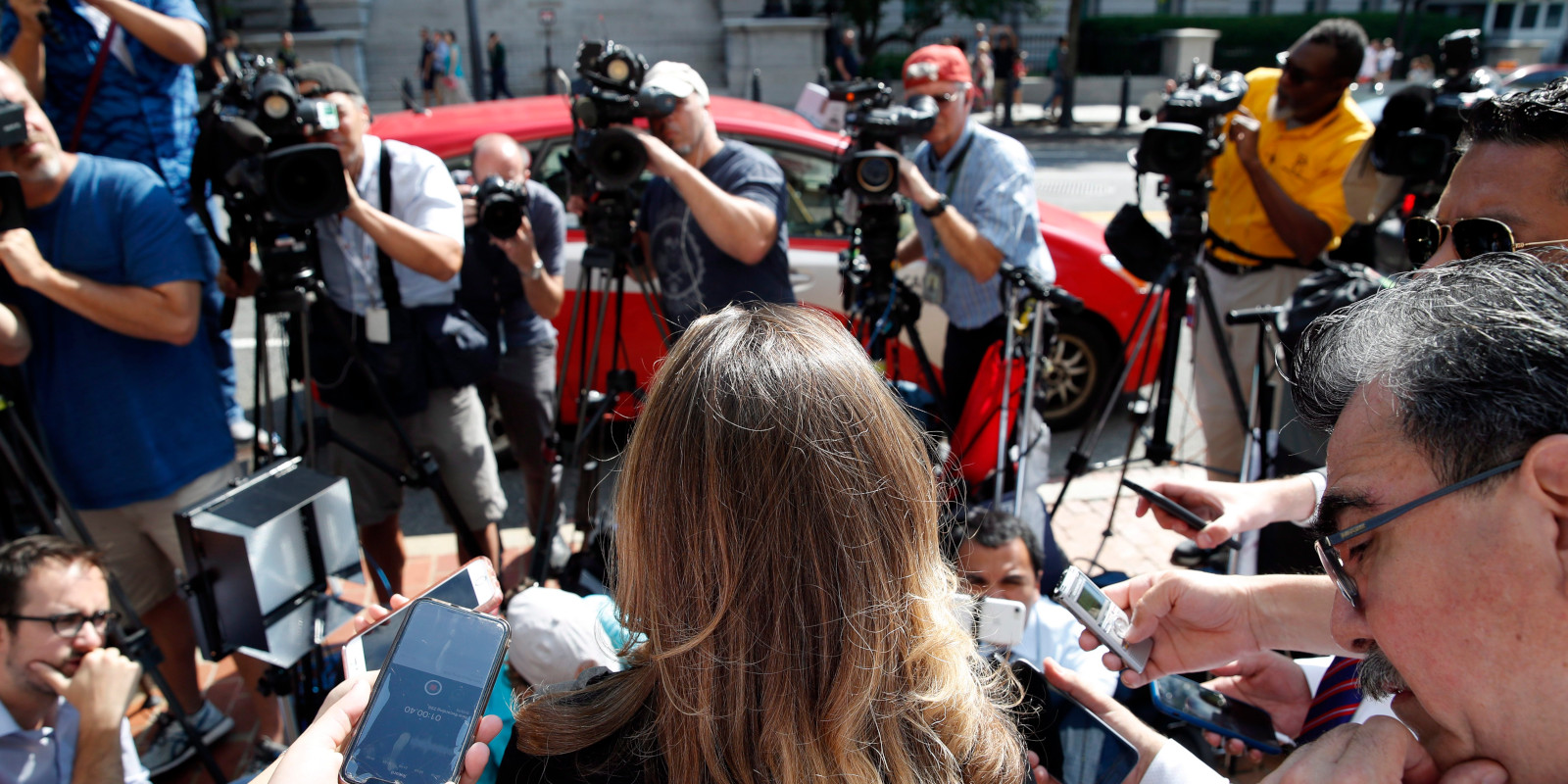The news media in Canada is in crisis. Policy responses to date are failing to solve for the information that citizens need to make informed decisions about important issues and debates. The Future of News series brings together leading practitioners, scholars, and thinkers to imagine new business models, policy responses, and journalistic content that can support a dynamic future for news in Canada.
Foreign bureaus keeping Canadians informed about the world beyond our borders have all but disappeared. According to new data collected by The Hub, there could be less than 60 full-time journalists from the major outlets reporting on world events, with 45 of those working for the CBC.
There now appears to be no permanent Canadian correspondents from the major newspapers or broadcasters based in the Middle East, in the midst of an Israel-Hamas war now entering its sixth month. There seems to be no permanent Canadian journalists on the ground in Russia, two years after it initiated the largest attack on a European country since the Second World War. There also appears to be no Canadian foreign correspondents stationed within the world superpower that is mainland China.
“It’s really really disheartening,” says Global National News senior correspondent Jeff Semple when shown the numbers. Semple has reported from more than 40 countries and has worked as a Europe bureau chief and a London correspondent. “These foreign bureaus are closing at a time when our need to understand what’s going on in the world is only increasing.”
“It’s sad. It’s discouraging,” says journalist and author Andrew Cohen. “It leaves us less informed. It misses nuances. It misses angles. It misses the kinds of stories that a Canadian audience might want to read.” During his career, Cohen filed stories as a journalist from Washington, London, and Berlin. Since then, he taught international affairs reporting at Carleton University’s journalism school for 23 years.
“I could [now] no longer in good conscience teach a course in which I could say to my students, ‘Work hard, dream big. And maybe you’ll be a foreign correspondent one day for Canada,’” he says. “Because those jobs essentially no longer exist.”
These vanishing foreign bureaus are a result of news outlet cost cutting, as the media industry suffers massive layoffs and reduced viewership and readership. But, it may also be a reaction to a Canada that has a shrinking footprint on the world stage, say experts.
Canadian media once had multiple foreign bureaus dotting the globe in places like Beijing, London, Washington, Los Angeles, Berlin, New Delhi, Kampala, Moscow, Mexico City, Jerusalem, Sydney, Pretoria, and Brazilia.
When Cohen was a The Globe and Mail correspondent from 1997 to 2001, he described reporters being posted throughout the U.S., with a “large happy Canadian contingent” in Washington.
“This is 25 years ago. We were serious. Journalism in Canada was serious about the world. We no longer are,” he admits.
Canadian bureaus today
The Hub reached out to the major Canadian newspapers and broadcasters and asked them how many foreign bureaus they still have in operation.
Up until a few years ago, CTV News operated international bureaus in 10 cities around the globe. Last year, it closed the doors of its London and Los Angeles bureaus. Since then, it announced major layoffs in its TV and radio divisions. It now has just one bureau left, with one journalist in Washington covering the U.S.
The Toronto Star recently closed its last foreign bureau, also in Washington. It has one writer covering international affairs, in Paris, France.
Global News has two permanent employees in Washington and two journalists in London.
The Canadian Press has one foreign correspondent, in Washington.
Postmedia, which includes The National Post has no foreign bureaus remaining.
The Globe and Mail now has one reporter based in London and another in Rome covering all of Europe. One journalist in Johannesburg covering the continent of Africa. One covering all of Asia from Hong Kong. One journalist in Washington covering the U.S. And two general international correspondents.
In 2012, CBC shuttered its bureaus in Africa and South America. But approximately 45-full time journalists still work abroad for CBC/Radio-Canada, out of New York, Washington, London, Mumbai, Paris, and Taiwan.
The world through ‘Canadian eyes‘
Canadian outlets are increasingly relying on newswire coverage from foreign news outlets, freelance “stringers,” and even reporters based in Canada so that they do not have to pay for Canadian correspondents on the ground. It means some events get coverage, but this comes at another cost, says Semple.
“When you live in a faraway place you come to understand that place in a way that you simply can’t by visiting or by reading a note from afar,” Semple says. The veteran journalist said it was only by being stationed in the U.K. during the Brexit debate that he was able to escape the bureaucratic discussions being held in London, travel to rural Britain, and hear directly from residents why they felt left behind and would be voting to leave the EU.
According to Cohen, fewer Canadian journalists abroad means fewer Canadian perspectives and the loss of a more critical detached take on the foreign country they’re covering. He says there is a “Canadian sensibility” that our correspondents bring to their coverage. That they act as a sort of “interpreter” for Canadians back home.
“Will they [the public] hear about what Canada is doing? Will they really hear about the world through Canadian eyes?”, he asks.
“A Canadian will do a better job of explaining something to other Canadians,” adds Semple.
Without Canadian reporters on the ground, Canadians’ actions abroad can also go unreported, says journalist and filmmaker Michelle Shephard, formerly the Toronto Star’s national security reporter. Shephard insists stories around human rights abuses involving Canadian mining companies operating abroad, or the Canadian government providing humanitarian aid to Yemen while allegedly providing weapons to that war, likely would receive far less coverage without Canadian journalists being there.

Budgeting for bureaus
Foreign bureaus are expensive to operate and appear to be first on the chopping block when cuts arrive.
“It’s a costly endeavour,” admits Brodie Fenlon, CBC’s general manager and editor-in-chief, in an email to The Hub. Fenlon adds that costs include support staff, licenses, foreign taxes, office space, and gear.
The costs only increase when you’re a Canadian on the ground in a conflict zone. During Semple’s visits to Ukraine, he is accompanied by a full-time security guard, who is often former special forces. That’s on top of pricey insurance coverage. It raises the question that if Canada enters another armed conflict, will Canadian outlets be able to afford putting reporters on the ground?
Nevertheless, others say the public should be more concerned about putting local reporters on the ground in Canada, who will cover our own country.
“I still mourn the cuts to local news more than I do foreign news,” Shephard tells The Hub in an email. “The whole industry is hurting and I understand why foreign news is often on the chopping block first. It’s expensive and while it’s not the same, at least there are other outlets covering it.”
Banished by authoritarian regimes
It is not merely high costs that are forcing the closure of Canadian bureaus, but also vengeful regimes.
In 2022, CBC shut down its Beijing bureau after more than 40 years. Their journalists were denied visas by the Chinese government.
That year, CBC journalists were also kicked out of Russia and stripped of their accreditation, leaving their bureau in Moscow after more than 44 years. Russia was retaliating to Canada banning their state TV channel Russia Today. CBC News was the only permanent Canadian media presence in Russia.
Semple says this lack of Canadian presence in “countries we don’t understand” means the public is robbed of getting to the bottom of what is going on in Russia and how ordinary Russians truly feel about the war in Ukraine.
Canada on the world stage
Some say Canada’s media retreat abroad mirrors our country’s decades-long retreat internationally.
Former Canadian diplomat Ben Rowsell recently told The Hub that Canadian diplomacy is now “in retreat,” with “withdrawal from the world” being a “top priority.”
According to Cohen, this is reflected in the scarcity of foreign correspondents.
“Where we are now as a country is very much reflected in how we cover the world. And we don’t. We have withdrawn,” says the author of the book While Canada Slept: How We Lost Our Place in the World. “You have a diminished media in a diminished country.”
Cohen says this is a “vicious circle,” in that when Canadians are not informed about what their country is doing abroad, they are less likely to demand Canada have a more robust international presence abroad. Then, the media is left with minimal stories around Canada on the world stage to cover.
Still, Semple says while Canada may be less influential than it once was, announcing you are a Canadian journalist still surprisingly gains you respect and opens doors when it comes to access and interviews. In some ways, the reputation remains.
“Being Canadian still holds a lot of weight,” he explains. “How much of that is sort of a leftover of a time when Canada was seen differently on the world stage? I don’t know. But it’s still really a thing.”
Clarification: Since this article was published, CBC sent The Hub new numbers and clarified that CBC/Radio-Canada in fact employs 45 full-time journalists outside Canada, rather than 40.
The Future of News series is supported by The Hub’s foundation donors and Meta.
Recommended for You

Laura David: Red pill, blue pill: Google has made its opening salvo in the AI-news war. What’s Canadian media’s next move?

The Notebook by Theo Argitis: Mark Carney’s first major tests

Need to Know: Legacy media has a diversity problem

Brace for impact: something big is about to happen to the news in Canada




